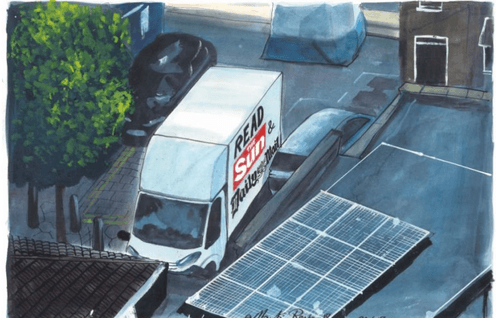Daily Mail vs The Guardian: why did editor Paul Dacre lose his rag?

“Words have consequences. They lead to actions.” So wrote Peter Oborne, the maverick right-leaning Daily Mail columnist about the shocking events in north London recently when a white van deliberately ran into a crowd of Muslims outside a mosque, killing one and injuring several others.
Oborne did not write this for his weekly column (it was in the online journal Middle East Eye) nor did he mention the Mail by name. He did, however, conclude a powerful piece by saying that “the moment has come for some of my colleagues (and, in some cases, friends) in the conservative press to ask some deep, searching questions about their own use of language about Muslims and Islam”.
A day later, the Guardian featured a cartoon by Martin Rowson which mocked up a picture of the van and superimposed on its side: “Read the Sun & the Daily Mail” using the easily recognisable logos of both newspapers.
It was a brilliantly simple and satirical means of delivering exactly the same message as Oborne: that the right-wing press – and particularly the two daily papers with the highest circulations in Britain – must take responsibility for the barrage of anti-Muslim propaganda which both papers have been peddling through their news and editorial columns for years.
This was too much for the Mail’s editor-in-chief Paul Dacre and the paper responded with a furious tirade directed at the Guardian. Taking a whole page of Thursday’s Daily Mail, in an editorial dominated by a headline which screamed “Fake news, the fascist Left and the REAL purveyors of hatred”, the editorial aimed both barrels at the newspaper – and its left-liberal readership – which Dacre has made no secret of despising.
Two competing voices
The sheer visceral ferocity of this editorial broadside took even some seasoned observers by surprise. But it can be understood in the context of two opposing visions of post-Brexit Britain. The Guardian – which has tried with varying degrees of success to export its news brand to Australia and the US – represents Britain’s liberal conscience, embracing causes such as greater redistribution of wealth and Britain’s place in Europe, while campaigning against human rights abuses and climate change.
The Mail is the complete antithesis, ferociously anti-Europe with a long history of supporting right-wing causes including – famously – the Hitler-supporting blackshirts during the 1930s. It claims to speak for “Middle England”, an amorphous construct which is better described as a traditional, older and predominantly white readership.
It was this readership which Dacre’s savage attack purported to defend, arguing that the Guardian’s cartoon was sick, disgusting and “so deranged and offensive to the 4m decent, humane and responsible people who read us that we owe it to every one [of them] to lay to rest this malicious smear”.
Confusing claim
Apart from its ferocity, Dacre’s editorial was remarkable for two things. First, it attempted to argue that the Mail newspaper was completely separate from Mail Online which “has its own publisher, its own readership, different content and a very different world view”. He was keen to distance the paper, in particular, from the right-wing columnist Katie Hopkins and her deliberately provocative commentary following the Manchester and London terrorist attacks (including one tweet, since deleted, calling for a “final solution”).
This sleight of hand was very quickly demolished by, among others, LBC presenter James O’Brien, who asked how this apparent separation can be reconciled with Dacre’s apparent receipt of a performance-related £263,388 bonus for continuing to invest in digital consumer media, particularly Mail Online.
And as many others pointed out, the Mail Online site states explicitly: “Published by Associated Newspapers Ltd Part of the Daily Mail, The Mail on Sunday and Metro Media Group.”
Second, Dacre also insisted that there was “not a shred of evidence” for the Guardian’s implicit claim that the Mail was encouraging Islamophobia. He declared confidently that “we harbour not the faintest animosity towards others on account of their colour or creed”. Others, however, were very quick to provide the evidence from Dacre’s own paper.
Influential blogger Liz Gerard tweeted out a choice selection from the Mail’s Mac cartoons, including one infamous example which showed an outline of sinister-looking people, quite clearly caricature Muslims, crossing into Europe accompanied by scurrying rats. Others posted links to headlines – particularly numerous in the run-up to last year’s referendum – with inflammatory headlines such as “Fury over plot to let 1.5m Turks into Britain” and “PM: UK Muslims helping jihadis”.
What explains this sudden outburst of rage which had several observers – not only on the left – scratching their heads? A simple explanation may be the general election result. Not only had Dacre hitched the paper’s wagon firmly to Theresa May, but he had orchestrated a series of attacks on Jeremy Corbyn, warning of everything from national bankruptcy to freedom for terrorists should Labour be elected.
It was a rude awakening when the Conservatives snatched defeat from the jaws of certain victory, and quite possible a defeat that Dacre felt personally. I have argued elsewhere that we should beware simplistic assumptions about the declining power of Britain’s tabloid press.
But this editorial suggests that Dacre at least feels that allegations of barely concealed racism in his newspaper are more potent – and that its “middle-England” values are more vulnerable – than they were just three weeks ago. For him personally it seems an uncomfortable – and possibly permanent – shift in the political centre of gravity.
This article was originally published on The Conversation. Read the original article.

Steven Barnett does not work for, consult, own shares in or receive funding from any company or organisation that would benefit from this article, and has disclosed no relevant affiliations beyond the academic appointment above.

 Yahoo News
Yahoo News 

